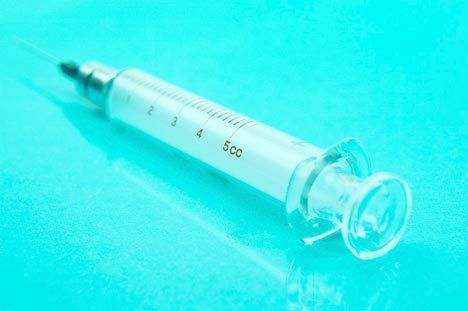The first, small amounts of H1N1 influenza (swine flu) vaccine have been released by the federal government and will be arriving locally next week in King County for immunization of health-care workers. The larger amounts of vaccine that are needed to begin broader-scale vaccination for people who are at higher risk for H1N1 are projected to begin arriving in mid-October.
“This small, initial shipment will be targeted to health-care providers, and subsequent doses that arrive later in the month will be prioritized to those who most need it because they are at higher risk,” said Dr. David Fleming, Director and Health Officer for Public Health – Seattle & King County. “As soon as supplies are sufficient, everyone will have an opportunity to protect themselves from H1N1 influenza, and we’re working to make the vaccine as easy as possible to get.”
Vaccine arrival and priority
A small amount of 20,000 doses of flu vaccine for King County are expected to arrive next week. These first doses will be nasal-spray flu vaccine (FluMist®) and made available to healthcare providers who are eligible for FluMist® use (i.e., healthy people 2-49 years of age who are not pregnant). Healthcare providers are a priority group for vaccination, as they are at high risk for infection and could put vulnerable patients at risk.
In mid-October, larger shipments of vaccine are expected to begin to arrive weekly and will be available for people at higher risk of H1N1 influenza as recommended by the Centers for Disease Control and Prevention:
o Pregnant women
o People who live with or care for children younger than 6 months of age
o People between the ages of 6 months and 24 years old
o People between 25 through 64 years of age with chronic health conditions or weakened immune systems
Vaccine availability will be opened up to everyone who wants it as soon as supplies are sufficient to cover demand in risk groups.
Ways to get vaccine
As larger amounts of vaccine become available, it will be initially prioritized for use by medical providers but will also be available through multiple channels in the community, so that it will be as easy as possible for people throughout the community to get protection. More information will be forthcoming as vaccine becomes available for public distribution, including on Public Health’s website at www.kingcounty.gov/health/H1N1
Channels for receiving vaccine will include:
o From regular health care providers – such as pediatricians, family practice doctors and obstetricians.
o Pharmacies and other commercial vendors – like seasonal flu, most major pharmacy chains will offer H1N1 vaccine to the public.
o Community vaccination clinics – Public Health will offer public vaccination clinics at community sites, such as community centers, Public Health Centers and at schools after hours. These clinics will be focused on vaccinating people who have limited or no access to the health care system.
o Employers of health care and emergency medical services personnel will provide vaccine to their employees who provide patient care.
Flu vaccine will be provided at no cost. Health care providers, pharmacies and commercial vaccinator will charge an administration fee approximately $15, but most insurers will reimburse costs. To ensure that cost is not a barrier to vaccination, no administration fee will be charged at community vaccination clinic sites.
Types of vaccine
There are two types of H1N1 flu vaccine:
1. The injectable “flu shot” is given with a needle, usually in the arm. There are different formulations and dosing for the shot.
2. Nasal-spray flu vaccine (FluMist®) is a weakened live virus vaccine that can be given to healthy people 2-49 years of age who are not pregnant, including household contacts of most people who are at highest risk for serious complications of the flu.
Seasonal flu vaccine protects against three strains of seasonal influenza virus that may circulate this fall and winter. Seasonal flu is separate from the H1N1 influenza vaccine and is widely available from pharmacies and some healthcare providers now. Seasonal flu vaccine also comes in injectable and nasal-spray forms. People in high risk groups for seasonal flu strains (such as seniors) and anyone who wants it should get both H1N1 and seasonal influenza vaccines so that they are fully protected.
Local flu activity
As Public Health makes preparations for vaccine delivery, local monitoring for influenza has detected increasing levels of activity in the community through September, including higher numbers of people reporting with influenza-like symptoms in local emergency rooms. Flu activity is expected to continue to increase over the coming weeks to potentially high levels.
People can help slow the spread of H1N1 influenza until the vaccine is available by taking simple steps, including:
o If you are sick, stay home from work or school. Remain home for at least 24 hours after fever has passed (without the use of fever-reducing medications).
o Cover coughs and sneezes with a tissue or inner elbow.
o Wash hands often with soap and water, especially after coughing or sneezing. If access to soap and water isn’t available, use an alcohol-based hand sanitizer.
For updates and more information on H1N1 influenza visit www.kingcounty.gov/health/H1N1 or call the Flu Hotline, 877-903-5464, 24 hours/day (English and Spanish).
Talk to us
Please share your story tips by emailing editor@kentreporter.com.
To share your opinion for publication, submit a letter through our website https://www.kentreporter.com/submit-letter/. Include your name, address and daytime phone number. (We’ll only publish your name and hometown.) Please keep letters to 300 words or less.

